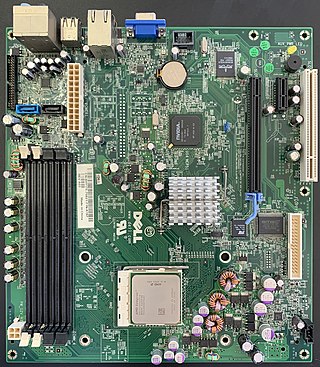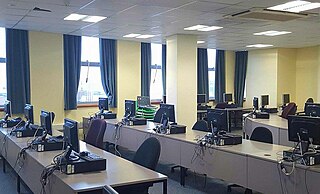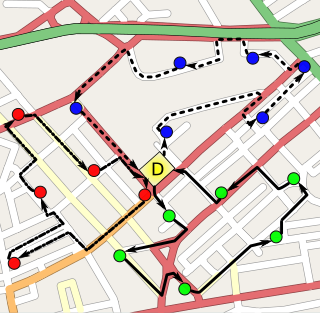Related Research Articles

Computing is any goal-oriented activity requiring, benefiting from, or creating computing machinery. It includes the study and experimentation of algorithmic processes, and the development of both hardware and software. Computing has scientific, engineering, mathematical, technological, and social aspects. Major computing disciplines include computer engineering, computer science, cybersecurity, data science, information systems, information technology, and software engineering.

Computer science is the study of computation, information, and automation. Computer science spans theoretical disciplines to applied disciplines.

Computer engineering is a branch of computer science and electronic engineering that integrates several fields of computer science and electronic engineering required to develop computer hardware and software. Computer engineering is referred to as computer science and engineering at some universities.
Computer science is the study of the theoretical foundations of information and computation and their implementation and application in computer systems. One well known subject classification system for computer science is the ACM Computing Classification System devised by the Association for Computing Machinery.
Computational archaeology describes computer-based analytical methods for the study of long-term human behaviour and behavioural evolution. As with other sub-disciplines that have prefixed 'computational' to their name, the term is reserved for methods that could not realistically be performed without the aid of a computer.

An academic discipline or field of study is a branch of knowledge, taught and researched as part of higher education. A scholar's discipline is commonly defined by the university faculties and learned societies to which they belong and the academic journals in which they publish research.
Theoretical computer science is a subfield of computer science and mathematics that focuses on the abstract and mathematical foundations of computation, such as the theory of computation, formal language theory, the lambda calculus and type theory.

Computer science and engineering (CSE) is an academic program at many universities which comprises approaches of computer science and computer engineering. There is no clear division in computing between science and engineering, just like in the field of materials science and engineering. However, some classes are historically more related to computer science, and other to computer engineering. CSE is also a term often used in Europe to translate the name of technical or engineering informatics academic programs. It is offered in both undergraduate as well postgraduate with specializations.
Computational science, also known as scientific computing, technical computing or scientific computation (SC), is a division of science that uses advanced computing capabilities to understand and solve complex physical problems. This includes

The Department of Computer Science is one of nine departments in the University of the Philippines Diliman College of Engineering.
The Bachelor of Computer Science is a bachelor's degree for completion of an undergraduate program in computer science. In general, computer science degree programs emphasize the mathematical and theoretical foundations of computing.

Computational Engineering is an emerging discipline that deals with the development and application of computational models for engineering, known as Computational Engineering Models or CEM. Computational engineering uses computers to solve engineering design problems important to a variety of industries. At this time, various different approaches are summarized under the term Computational Engineering, including using computational geometry and virtual design for engineering tasks, often coupled with a simulation-driven approach In Computational Engineering, algorithms solve mathematical and logical models that describe engineering challenges, sometimes coupled with some aspect of AI, specifically Reinforcement Learning.

Information and computer science (ICS) or computer and information science (CIS) is a field that emphasizes both computing and informatics, upholding the strong association between the fields of information sciences and computer sciences and treating computers as a tool rather than a field.
Informatics is the study of computational systems. According to the ACM Europe Council and Informatics Europe, informatics is synonymous with computer science and computing as a profession, in which the central notion is transformation of information. In some cases, the term "informatics" may also be used with different meanings, e.g. in the context of social computing, or in context of library science.

Applied mathematics is the application of mathematical methods by different fields such as physics, engineering, medicine, biology, finance, business, computer science, and industry. Thus, applied mathematics is a combination of mathematical science and specialized knowledge. The term "applied mathematics" also describes the professional specialty in which mathematicians work on practical problems by formulating and studying mathematical models.
This glossary of computer science is a list of definitions of terms and concepts used in computer science, its sub-disciplines, and related fields, including terms relevant to software, data science, and computer programming.

The TUM School of Computation, Information and Technology (CIT) is a school of the Technical University of Munich, established in 2022 by the merger of three former departments. As of 2022, it is structured into the Department of Mathematics, the Department of Computer Engineering, the Department of Computer Science, and the Department of Electrical Engineering.
References
- ↑ Orsucci, Franco F.; Sala, Nicoletta (2008). Reflexing Interfaces: The Complex Coevolution of Information Technology Ecosystems, Information Science Reference. p. 335. ISBN 978-1599046273.
- 1 2 3 "Computer and Information Research Scientists". U.S. Bureau of Labor Statistics. 29 March 2012. Archived from the original on 2 April 2012. Retrieved 9 September 2019.
- ↑ "Fields of Employment for Physics Bachelors in the Private Sector, tuty of 2010 & 2012 Combined". American Physical Society. Archived from the original on 17 October 2011. Retrieved 9 September 2019.
- ↑ "Computing Disciplines & Majors" (PDF). Archived (PDF) from the original on 6 September 2019. Retrieved 9 September 2019.
- ↑ Perry, Benjamin Beau. "What is a computer scientist?". The University of Newcastle. Archived from the original on 21 August 2016. Retrieved 9 September 2019.